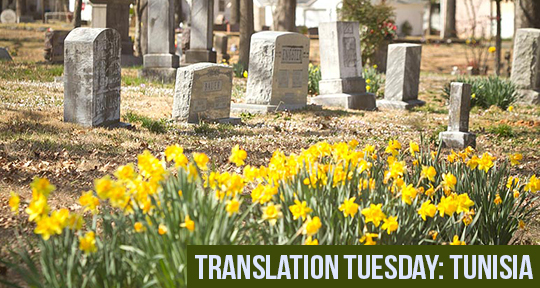For this week’s Translation Tuesday, a son mourning his mother’s death unearths secrets of his family history in Brahim Darghouthi’s short story, “The Ashes of Hell”. Our unnamed narrator finds miscellaneous keepsakes of his parents in a locked box, including letters from his father, a Muslim murdered by the Nazis in an apparent case of mistaken identity. Reflecting upon his mother’s subsequent anti-Semitic resentment, our protagonist recalls a deeper pain beneath this prejudiced demeanour. A short but powerful portrait of compounding grief and the often-destructive ways we deal with it, “The Ashes of Hell” delves into the ethics of family secrets and our obligations to the dead.
When I returned from the cemetery that bleak and fateful morning, I tapped on my mother’s door softly as if she were still lying asleep on her sickbed. I entered on tiptoe and went straight to her antique, oak coffer, decorated with all the colors of the rainbow.
Her distinct fragrance still hung in the air. I stared at the neatly made bed and whispered, “Forgive me, my dear, if I have to violate your secrets today.”
Taking me by surprise, she answered, “The coffer’s key is under the pillow, my darling.”
The scent of heaven immediately struck me as soon as I turned the key in the lock and slowly raised the paneled top. Some small items were neatly arranged inside: sandalwood, amber, small bottles of rosewater, a yellow quince, a small book of dhikr the size of a hand, three new candles, and a fourth that was half melted.
My mother had always hated power switches; to her, they resembled the fangs of rabid dogs.
Alongside the coffer’s contents were sticks of incense and coins hailing from the period of the French protectorate of Tunisia. They were pierced in the middle, and the inscriptions showed they had been minted during the reign of Nasser Pasha, the Bey of Tunisia and its outposts. I also found some letters that my father sent from France during World War II, before he met his death in a concentration camp that the Germans had constructed in “honor” of the Jews.
My father, like all Muslims, was circumcised, and Adolf Hitler’s soldiers had murdered him, believing he was one of God’s chosen people. Reciting the Shahada, “There is no God but Allah, and that Muhammad is the Messenger of Allah,” had not benefited him personally. All languages in those camps sounded the same to the Germans, and they were hell-bent on perceiving all the circumcised as Jewish.
My mother never ceased cursing the world’s Jews, and I had to listen to that story repeatedly from the age of ten. Every single time, that idea made me laugh uproariously, which only aggravated her anger. Then she’d stop reviling the Jews and start cursing my father, since he was the one who’d failed to disguise his genitals from the Germans’ eyes. A petty scrap of foreskin was the sole reason behind his death—the very skin the Jews had taught our desert ancestors to cut from their sons’ bodies. Our people had failed to realize that Jacob’s cousins, who joined them in those camps in France, would make those foreskins into ropes to hang them.
In her later years, once she finished her story, my mother would laugh and then say, “The late President Anwar Sadat was reconciled with that goddamned Menachem Begin because his Mossad informed him Mr. Sadat was circumcised, just like the Jews.”
Her expression would grow tender as she gently tapped my shoulder and continued, “Son, I never thought of getting married again after your father died. My heart became haunted by the ashes of hell after his bed became colder than the desert winter…”
From that moment on, I hid my mother’s secrets, large and small, in my heart and closed its seven doors, one after the other. I imagined her smiling in the grave.
“I won’t sell your wooden chest, decorated in rainbow shades,” I told her.
Spring grew over her grave.
Translated from the Arabic by Essam M. Al-Jassim
Brahim Dargouthi, or Darghouthi, (Tozeur, 21 December 1955) is a Tunisian novelist and short story writer. He’s a graduate of the Ecole Normale of teachers in 1975. Mr. Darghouthi is a member of the steering committee of the Union of Tunisian Writers and heads its branch in Gafsa. Many of his novels and short stories have been translated into more than one language.
Essam M. Al-Jassim is a Saudi writer and translator. He taught English for many years at Royal Commission schools in Jubail, Saudi Arabia. He received his bachelor’s degree in Foreign Languages and Education from King Faisal University, Hofuf. His translations appear in a variety of online and print Arabic and English literary journals.
*****
Read more on the Asymptote blog:

